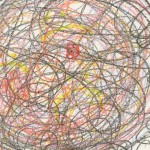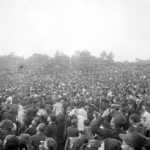How God Still Causes Things to Be
by Karlo Broussard
Filed under God

Atheists often claim that it’s contradictory for believers to assert that God is at the same time both the universal cause of all being and immutable. In other words, God can’t be changeless and at the same time changing, in the sense that he causes things to come into and go out of existence.
Consider, for example, that my act of typing this article right now is a reality ultimately because God causes it to be. His causal activity is not in opposition to my free action, but the presupposition for it. For whatever has being is ultimately caused to be by the source of being, God. Since my act of typing has being (it actually exists), it follows that God ultimately causes my action to be (even if he doesn’t cause every typo or imperfect metaphor that I choose).
By the time you read this article, however, my act of typing it will no longer exist. I’ll be engaged in other acts, such as throwing the football with my sons.
So, what God is causing to exist now (me typing this article in real time), he will no longer cause to exist when I shut down the computer. And what God was not causing to exist (me throwing the football with my sons), God will cause to exist.
But this seems to entail that God changes in his acts, acting to cause one thing at one moment in time, ceasing that act at another moment in time, and engaging in a new act to cause something else at some other moment in time.
If God brings about new effects in time, so it’s argued, he would have to engage in new acts of the will. And if that were true, he would change.
So it seems that if we affirm God as the ultimate cause of all temporal effects, we would have to say God changes. If we say God can’t change, then we couldn’t affirm that he’s the ultimate cause of all temporal effects. Neither of the two options is available for one who believes in the classical understanding of God.
Is a theist trapped?
Notice how the objection assumes that God’s causal action is located in time just like the effect is located in time, as if we can point to some moment in time before which he doesn’t act and after which he does. But there are good reasons to think this assumption is false.
God is eternal, and therefore doesn’t exist or act in the flow of time. He’s entirely outside the succession of moments in time, having all moments of time (our before and after) present to him simultaneously. Consequently, God doesn’t have a “before” and an “after.” And if that’s the case, then it’s not correct to assume that he begins to act after a certain time, before which he didn’t act.
Moreover, as the first and universal cause, God not only ultimately causes my act of typing but also the time at which he wills this act to be (5:00 pm October 14 in Brisbane, Australia). For if he were only the first cause of the action, and not the time at which the action occurred, then there would be some aspect of being (the temporal aspect of being) that would have escaped God’s universal causality. Since that can’t be, we know he must not only cause the action, he must also cause the particular moment in the flow of time at which the act takes place.
And because God can’t be conditioned by that which he causes to be (the particular moments in the flow of time at which all activity takes place), his causal activity can’t possibly be subject to time. In other words, God’s causal activity has no “before” and “after” because God’s causal activity itself determines the “before” and “after” of all activity. We have to be careful not to confuse, “God causes some things to be at some moments of time,” with “God, at some moment in time, causes some things to be.”
Since God’s causal action is not in time, it’s not necessary that he change in his act of causing new temporal effects (i.e., go from not causing to causing). Therefore, the assertion that God is the universal cause of temporal effects doesn’t contradict the claim that God is immutable.
Now, an atheist might respond, “Perhaps God doesn’t undergo change in his causal activity because he acts in time. But he must undergo change inasmuch as he acts as a cause, for change necessarily belongs to what it means to be a cause. So God, therefore, can’t be immutable and the universal cause of all things at the same time.”
The problem with this counter is that it assumes change necessarily belongs to what it means to be a cause.
Sure, the causes that we experience undergo change when they bring about an effect (e.g., me going from not engaging in the act of typing this article to engaging in the act of typing this article). But just because a cause of our experience changes when it causes an effect, it doesn’t necessarily follow that anything whatsoever that acts as a cause must undergo change.
All that’s necessary for a cause to be a cause of an effect is for the effect in question to be brought about by that cause. In other words, without the activity of the cause the effect would not be. There’s nothing in this understanding of a cause that necessitates the cause undergo change when it acts as a cause.
And that’s all a theist is saying when he says God causes temporal effects. Something comes into existence at a specific moment of time due to God’s causal action, and it goes out of existence ultimately because of God’s causal action.
So, the idea that some things are brought about at different moments of time, and that God is the ultimate cause that brings those things about at their distinct moments of time, in no way shows God must undergo change when he acts as a cause. There’s nothing in the notion of a cause that entails change and God’s causal action is not characterized by time.
At least on this front, theism passes the coherence test.
Related Posts
Note: Our goal is to cultivate serious and respectful dialogue. While it's OK to disagree—even encouraged!—any snarky, offensive, or off-topic comments will be deleted. Before commenting please read the Commenting Rules and Tips. If you're having trouble commenting, read the Commenting Instructions.












